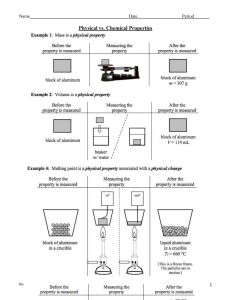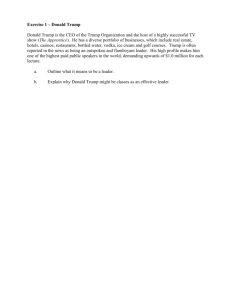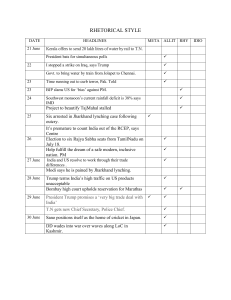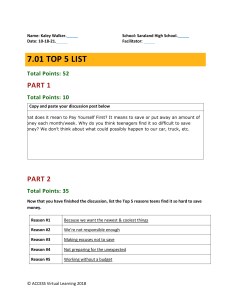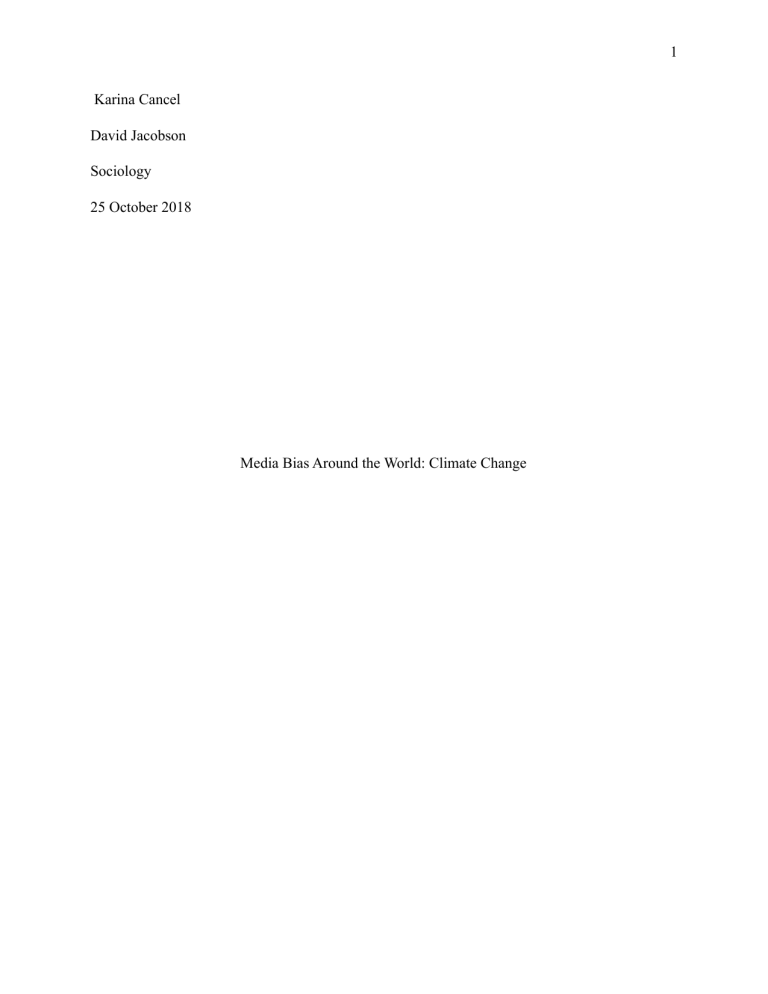
1 Karina Cancel David Jacobson Sociology 25 October 2018 Media Bias Around the World: Climate Change 2 The subject of climate change has become a household debate around the world. The dictionary defines climate change as, “a change in global or regional climate patterns, attributed largely to the increased levels of atmospheric carbon dioxide produced by the use of fossil fuels.” As more opinions and evidence is generated related to the subject of climate change, the tone quickly turned political. A candidate’s stance on climate change is in many voters opinion, a defining point. Regardless of your stance on climate change, it is hard to deny the increasing negative environmental changes evident in ecosystems and resource quality/abundance. When researching the topic of climate change, it is important to keep in mind their are both sides of the argument. One must be aware of the bias that is instilled within articles, interviews, or advertisements. One troubling example is displayed within our current government. There are laws being passed, decisions being made, and opinions expressed that are neglecting to accept any causal link between man-made climate change and current environmental degradation. United States The United States has already attempted to exit the Paris Agreement, an agreement with the United Nations that deals with “greenhouse-gas emissions, adaptation, and finance” (Palmer). One example of this country’s opposing viewpoints is found in President Donald Trump’s 60 3 Minutes interview by Lesley Stahl, that that aired on October 15th, 2018. Climate change was brought up on the heels of Hurricane Michael and the disaster it has caused in the panhandle. Michael came after the long hurricane season for 2017 after hurricanes like Irma (134 total casualties) and Maria (3,057 total casualties) and left 19 people dead (Stahl). The segment on climate change went as such: “Lesley Stahl: Do you still think that climate change is a hoax? President Donald Trump: I think something's happening. Something's changing and it'll change back again. I don't think it's a hoax, I think there's probably a difference. But I don't know that it's manmade. I will say this. I don't wanna give trillions and trillions of dollars. I don't wanna lose millions and millions of jobs. I don't wanna be put at a disadvantage” (Stahl). This kind of disregard stems from Donald Trump’s party line affiliation. Being a Republican president saying statements like those above, is what is expected from someone with such a larger political agenda and ties in industries such as oil and coal. To shift the conversation from what is happening to the planet, to how much money will be spent and how many industrial jobs will be lost from attempting to control the problem, is rhetoric used to continue to enforce this partisan way of thinking. 60 Minutes is a heavily viewed program, both Trump and Lesley Stahl know this, so she begins with her concern of climate change, simultaneously pushing her agenda, knowing Trump’s loyalties and how people who share her belief will feel about his statements. Trump’s administration and their political agenda would thrive on a show like 60 Minutes and for that reason, he shows indifference to climate change. The unwillingness to exchange money for the environment is a way of thinking expected to be supported by his following and used to keep his followers, his followers. 4 United Kingdom This form of bias is not limited to solely the United States, another example of this political misinterpretation of words can be found in the conservative UK tabloid called, Mail on Sunday. This media outlet released an article from the journalist, David Rose, a British author, and journalist (Rose). Rose is known for his views on global warming and his belief that the world is going through a global warming “pause” (Rose). In said article, the statements that were made were used to target NOAA scientists who wrote articles to disproved his theory of any “pause” occurring in global warming. Said article was labeled an “attack” on climate change. The language used by both parties, the article and the articles critic, reflect their opposing values, agendas, and bias when it comes to climate change. Rose and Mail on Sunday targeted the scientists by “blowing this minor complaint into the sensationalist claim that “world leaders were duped into investing billions over manipulated global warming data” (Nuccitelli). Here you see the topic of money come back into place when it comes to dealing with climate change. Finance has a large influence when it comes to the viewpoints in environmental issues. Canada When you compare Canada to nations like the United States, the Canadian media displays a lack of neutrality when discussing both scientific findings about climate change and skeptics (Stoddart). Whatever sort of coverage the issues gets, is more one sided considering the government has strong support for working to slow global warming. The conversation is 5 controlled by the government, policy making, policy measures for mitigation, and issue coverage by mass media outlets. These combined factors are crucial in communicating environmental concerns to the general public (Stoddart). One article from the official website of the Canadian government, has a contrasting message from that of President Trump. The article's title reads, “Clean technology and jobs”, and was written to gain supporters for their agenda (Stoddart). When it comes to climate change, it can be objectively said that the shift to more environmentally friendly energy means the loss of countless jobs in industries like coal and oil. This title and article in general speaks on the jobs that will be made, but makes no mention of how many will be loss before any of this can occur. This reflects the values and beliefs of the government and those in favor but sheds no light on the skeptics and the value points they bring to the debate. Germany When looking through Germany’s media coverage of climate change, one will come across the “EIKE”, or the European Institute for Climate and Energy. The purpose of this group is to provide arguments that go against, “claims of a man-made catastrophe coming from climate change” (Gosselin). The group has been labeled, “climate change deniers” (Homepage). Articles written by EIKE depict the climate activists as uneducated and inferior in opinion when compared to the EIKE. Subtitles like, “Major Attack with Aim to Silence” and “Abuse of Institutional Authority”, leads the reader to believe that climate activists in Germany are the aggressors but in reality the titles have little to do with the actual content. Throughout the entirety of this article, language used to make the EIKE seems small, innocent, and persecuted all 6 ties together at the end of the piece. The final paragraph invites readers to an EIKE conference this month, asks readers for donation, and also suggests they share the article. Again, financial motivation behind bias instilled in climate change related media is evident. There is no denying that our planet is being negatively affected by greenhouse gases, air pollution, and deforestation. Whether or not these events can be slowed with mankind’s efforts is clearly something up for great debate. It is very difficult to approach this subject objectively. Scientists have supplied the data but how the data is used to influence the masses is up to the media and their motives. There are also scientists who work for corporations, politicians, and companies who need them to get results that will help support their agenda. There have been cases where a company who believes in climate change, hires a scientist to collect data from places with extreme weather simply to strengthen their argument and gain more coverage or receive more donations. The opposite can happen with companies that want to denounce climate change. Whether social, economic, or political, the slightest loyalty or motive can cause these media viewpoints to be skewed in favor of whatever agenda they have. 7 Works Cited Carvalho, A; Burgess, J (December 2005). "Cultural Circuits of Climate Change in UK Broadsheet Newspapers". Risk Analysis. 25 (6): 1457–1469. doi:10.1111/j.1539-6924.2005.00692.x. “Climate Change.” Merriam-Webster, Merriam-Webster, www.merriam-webster.com/dictionary/climate%20change?src=search-dict-hed. Gosselin. “Climate Dissenting EIKE Files Defamation Suit... Worst Assault On Scientific Dissent In Germany In Decades.” NoTricksZone, 31 Oct. 2018, notrickszone.com/2018/10/31/dissenting-eike-files-defamation-suit-worst-assault-on-scie ntific-dissent-in-germany-in-decades/. Homepage, Europäisches Institut für Klima und Energie. Archived October 30, 2018. Translated with Google Translate. WebCite URL: http://www.webcitation.org/6cfh3K3U7 Nuccitelli, Dana. “The Mail's Censure Shows Which Media Outlets Are Biased on Climate Change | Dana Nuccitelli.” The Guardian, Guardian News and Media, 25 Sept. 2018, www.theguardian.com/environment/climate-consensus-97-per-cent/2017/sep/25/the-mail s-censure-shows-which-media-outlets-are-biased-on-climate-change. Palmer, Pallab (July 2, 2018). "Hawking says Trump's climate stance could damage Earth". BBC News. Retrieved Sept 5, 2018. Rose David. “Global warming 'pause' may last for 20 more years and Arctic sea ice has already started to recover,” Mail on Sunday, November 2, 2013. A 8 Stahl, Lesley. “President Trump on Christine Blasey Ford, His Relationships with Vladimir Putin and Kim Jong Un and More.” CBS News, CBS Interactive, 2018, www.cbsnews.com/news/donald-trump-full-interview-60-minutes-transcript-lesley-stahl2018-10-14/. Stoddart, Lewies. Canada, Government of Canada, Environment. "biodivcanada.ca - Technical Reports". www.biodivcanada.ca.

